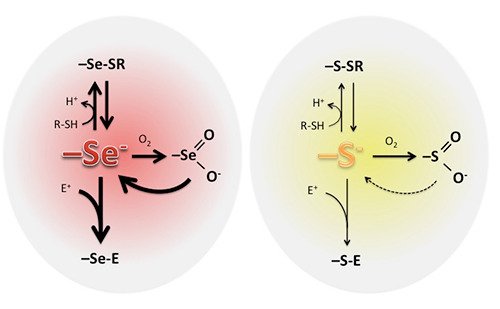Research Division of Biochemistry
The Division of Biochemistry has a long history of research in redox biology. Several projects in the division center around the role of thioredoxin and glutaredoxin systems in health and disease. Another focus is on the synthesis, function and biomedical applications of selenoproteins, i.e. proteins containing a reactive selenocysteine (Sec) residue. We furthermore study lipid flux and organelle biogenesis as fundamental mechanisms underlying cellular metabolism in health and disease.
Research interests

Enzymatic redox control systems, i.e. regulated reduction and oxidation processes that in turn regulate cellular functions, are crucial for life. Many, if not most, cell functions are linked either directly or indirectly to redox processes. The research carried out in our division is aimed at better understanding basic characteristics of redox biology in health and disease, from structure and function of redox active enzymes to regulation of redox signaling in living cells or organisms.
Our special focus areas of redox biology involve in-depth studies of the thioredoxin and glutaredoxin systems, selenoproteins, redox signaling cascades, cancer therapeutics and antimicrobial therapy. Our methodologies span from all aspects of enzyme and protein characterizations, biochemical assays of redox protein function, techniques of molecular biology and cell biology to animal experiments.
We are also studying the molecular logic of lipid flux and organelle biogenesis to understand how cellular metabolism, including neutral lipid handling, is organized at the nanoscale in health and disease. By combining advanced cell biological and imaging approaches, including in-cell cryo-electron tomography, we aim to reveal the membrane architectures and dynamic processes that drive lipid flux in their native cellular context.
Research groups
Areas of interest include novel methods of selenoprotein production and their studies, thioredoxin reductases, thioredoxin related protein of 14 kDa, transcription factor regulation, anticancer therapy, redox signaling.
Nanoscale organization of lipid flux and organelle biogenesis.
Contact
Elias Arnér
Head of Division, ProfessorPostal address
Karolinska Institutet
Dep. of Medical Biochemistry and Biophysics (MBB)
[name of recipient]
SE-171 77 Stockholm
Visiting address
Biomedicum, A9
Solnavägen 9
SE-171 65 Solna
